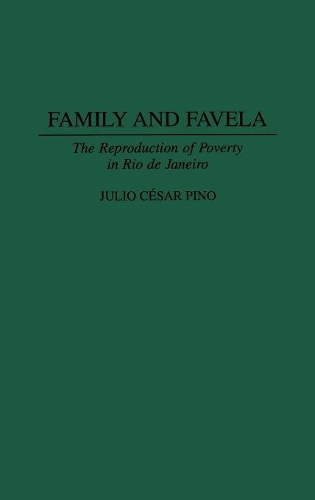
Family and Favela: The Reproduction of Poverty in Rio de Janeiro
(Hardback)
Publishing Details
Family and Favela: The Reproduction of Poverty in Rio de Janeiro
By (Author) Julio Pino
Bloomsbury Publishing PLC
Praeger Publishers Inc
23rd September 1997
United States
Classifications
Tertiary Education
Non Fiction
Sociology: family, kinship and relationships
Urban communities / city life
History of the Americas
306.85098153
Physical Properties
Hardback
216
Description
As a history of family life in the squatter settlements of Rio de Janeiro from the 1940s to the 1960s, this study shatters the myth of household disorganization said to be the norm among the urban poor. Using quantitative evidence, field reports by social workers, newspaper accounts, and the recollections of the squatters themselves, the study dissects household structure, economic activity, living standards, and political participation among the one million favelados (squatters) living in Rio by 1960, singling out three favelas for comparative analysis. Favelados prized family life, and most succeeded in holding their households together against daunting odds. Shantytowns provided residence close to the workplace, and some were erected literally in the shadow of the construction projects where the squatters worked. Indeed, the location and economic activity of the surrounding neighborhood largely determined the ability of the favela to survive. As squatters became an important part of the city work force, they mobilized to put pressure on the authorities to provide collective services like water and electricity.
Reviews
"Julio Cesar Pino has produced a concise study that demonstrates how the explosive growth of favelas, the famed shantytowns of Rio de Janeiro, was nearly inevitable--"the nightmare side of Brazilian economic growth in the twentieth century.,."a fine study with abundant documentation."-Hispanic American Historican Review
Julio Cesar Pino has produced a concise study that demonstrates how the explosive growth of favelas, the famed shantytowns of Rio de Janeiro, was nearly inevitable--"the nightmare side of Brazilian economic growth in the twentieth century.,."a fine study with abundant documentation.-Hispanic American Historican Review
Pino's book is based on extensive archival research, offers useful statistical analysis, and always retains its personal touch. A valuable contribution to the literature on urban Brazil.-Choice
The major contribution of this book is its research...it has two very interesting characteristics: the shift of the focus from the study of individual cases towards the study of the families, and the fact that very important information came from private papers and testimony of individuals who lived in the favelas. To reach a better understanding of the Rio's poor, Pino "did not simply look for documents but searched for people." (p.5)-South Eastern Latin Americanist
This important study attempts to deconstruct the myths built up around favelas. It successfully debunks the notion that the demolition of te favelas is the first step toward eradicating poverty....Family and Favela: The Reproduction of Poverty in Rio de Janeiro is a valuable contribution to the literature in urban Brazil.-Journal of Third World Studies
This volume makes an important contribution in the area of family and modernization history by addressing critical problematics of urban, working-class, and family history in insightful ways. It should be required reading for Latin American urban and family historians and will be an attractive text for undergraduate and graduate teaching.-American Historical Review
"Pino's book is based on extensive archival research, offers useful statistical analysis, and always retains its personal touch. A valuable contribution to the literature on urban Brazil."-Choice
"This important study attempts to deconstruct the myths built up around favelas. It successfully debunks the notion that the demolition of te favelas is the first step toward eradicating poverty....Family and Favela: The Reproduction of Poverty in Rio de Janeiro is a valuable contribution to the literature in urban Brazil."-Journal of Third World Studies
"This volume makes an important contribution in the area of family and modernization history by addressing critical problematics of urban, working-class, and family history in insightful ways. It should be required reading for Latin American urban and family historians and will be an attractive text for undergraduate and graduate teaching."-American Historical Review
"The major contribution of this book is its research...it has two very interesting characteristics: the shift of the focus from the study of individual cases towards the study of the families, and the fact that very important information came from private papers and testimony of individuals who lived in the favelas. To reach a better understanding of the Rio's poor, Pino "did not simply look for documents but searched for people." (p.5)"-South Eastern Latin Americanist
Author Bio
JULIO CSAR PINO is Associate Professor of History at Kent State University.
